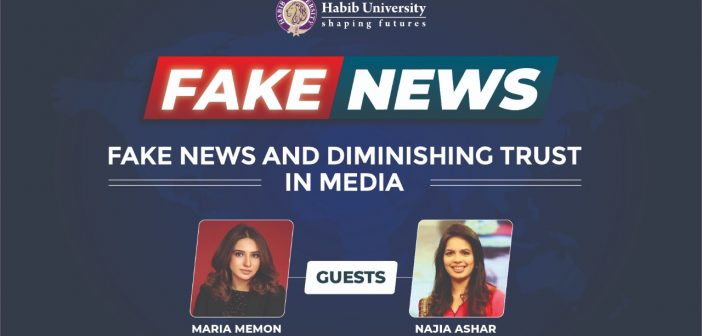As part of Habib University’s Breaking the Story series, a webinar on “Fake News and Diminishing Trust in Media” was conducted on Saturday, 17th July 2021. Presenting the event was Habib University’s Marketing & Communication Head, Ms. Aqsa Junejo, and co-hosting with her was Eesha Qazi (HU Class of 2022). A panel of esteemed guests, comprising of Najia Ashar, Maria Memon, and Masroor Gillani, was invited to hold a dialogue on origins, threats, and prevention of false news in local and global journalism.
The panelists unanimously agreed that fake news has an ability to reach a wide spectrum of audiences, influence their narrative, reinforce bias, and even alter social and political affiliations. The practice is dangerous to society at large as the audience falls into the trap of believing false facts and figures, accepting the agenda of those who have means to control.
The discourse began by stressing on the spread of fake news in more recent political history, discussing 2016 United States Presidential Elections. Ms. Memon provided valuable analysis on how false narrative was and can be used as a powerful tool by influential groups to dictate, and even alter, the political outcomes and associations of consumers of media. Ms. Memon further compared and drew similarities of fake news between 2016 United States’ election and Pakistan’s 2013 general elections.
Building on breakdown provided by Ms. Memon, Ms. Ashar acknowledged that living in “post-truth” world, news outlets have lost their credibility. Rather, according to Ms. Ashar, the influence of emotions, hateful or otherwise, is making its way in the deliverance of news. Our panelist highlighted the fact that the line between facts and sentiments in journalism has been blurring, especially given the recent political and social developments.
Ms. Ashar indicated that the practice of fake news is not something newfangled. In fact, almost all socio-political debates, ranging from vaccines to climate change, have been subjected to false narrative being spread for decades. By this means, Ms. Ashar suggested that the world senses the effect of fake news even more today because of easier access to the platforms, in particular social media, that broadcast the counterfeit facts.
The esteemed panel of journalists also emphasized on the responsibility of mainstream media, which has been “polarized to an extreme extent”, according to Ms. Ashar. The panelists agreed that mainstream journalism in Pakistan has been fractioned in two sections: one that overly sensationalizes the news, furthering it from actuality, and second, that despite attempting to provide factually correct news are labelled as defectors.
The discussion also touched upon how journalists in Pakistan can defy the spread of fake news. Ms. Memon, sharing a personal experience of fighting the false narrative, suggested one should carefully analyze whether or not the news is perpetuating an agenda of the powerful few. Our panelists recommended that consumers have the responsibility to corroborate, cross-check, and verify any news before reacting or resharing in order to curb the spread of fake news.
The discussion on fake news also emphasized on the struggles of journalists, who tirelessly work to ensure that only accurate narrative is circulated on mainstream, social, and digital media. Adding on to this point, Ms. Ashar in particular highlighted the hardships and dilemmas female journalists in Pakistan face today. To cite an example, Ms. Ashar recalled an incident of a female journalist whose personal details were made public as a response to her covering an accurate news uncovering an influential individual. Therefore, the discussion emphasized on the fact that female journalists are often careful, and sometimes discouraged, to report an important and accurate news, fearing personal repercussions.
The discussion ended with the panelists recognizing the need of more factually correct and informative news outlets to be promoted in Pakistan to combat the spread of the epidemic of fake news. It was also highlighted that responsibility also lies within the consumers of news to fact-check the news before reacting or forwarding it to greater number of audiences.




